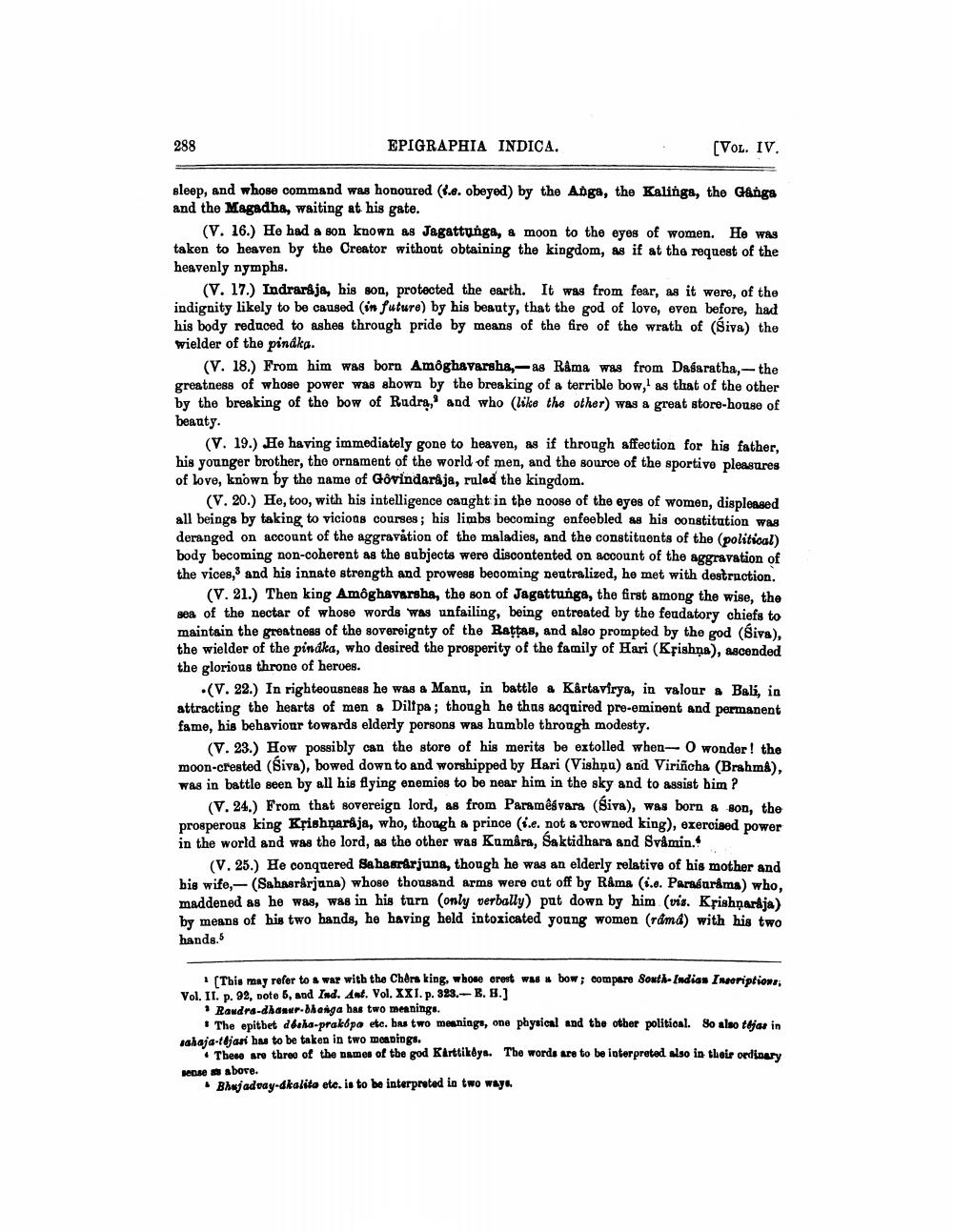________________
288
EPIGRAPHIA INDICA.
[Vol. IV.
sleep, and whose command was honoured (.e. obeyed) by the Anga, the Kalinga, the Ganga and the Magadhe, waiting at his gate.
(V. 16.) He had a son known as Jagattunga, & moon to the eyes of women. He was taken to heaven by the Creator without obtaining the kingdom, as if at the request of the heavenly nymphs.
(V. 17.) Indraraja, his son, protected the earth. It was from fear, as it were, of the indignity likely to be caused (in future) by his beauty, that the god of love, even before, had his body reduced to ashes through pride by means of the fire of the wrath of (Śiva) the wielder of the pinaka.
(V. 18.) From him was born Amoghavarsha, -as Rama was from Dasaratha,- the greatness of whose power was shown by the breaking of a terrible bow, as that of the other by the breaking of the bow of Rudra, and who (like the other) was a great store-house of beauty.
(V. 19.) He having immediately gone to heaven, as if through affection for his father, his younger brother, the ornament of the world of men, and the source of the sportive pleasures of love, known by the name of Govindaraja, ruled the kingdom.
(V. 20.) He, too, with his intelligence canght in the noose of the eyes of women, displeased all beings by taking to vicious courses; his limbs becoming enfeebled as his constitution was deranged on account of the aggravation of the maladies, and the constitaents of the political) body becoming non-coherent as the subjects were discontented on account of the aggravation of the vices, and his innate strength and prowess becoming neutralized, he met with destruction.
(V. 21.) Then king Amoghavarsha, the son of Jagattunga, the first among the wise, the sea of the nectar of whose words was unfailing, being entreated by the feudatory chiefs to maintain the greatness of the sovereignty of the Rattas, and also prompted by the god (Siva), the wielder of the pindka, who desired the prosperity of the family of Hari (Krishna), ascended the glorious throne of heroes.
.(V. 22.) In righteousness he was a Manu, in battle a Kártavirya, in valour a Bali, in attracting the hearts of men a Dilfpa; though he thus acquired pre-eminent and permanent fame, his behaviour towards elderly persons was humble through modesty.
(V. 23.) How possibly can the store of his merita be extolled when -- 0 wonder the moon-crested (Siva), bowed down to and worshipped by Hari (Vishnu) and Viriñoha (Brahma), was in battle seen by all his flying enemies to be near him in the sky and to assist him?
(V. 24.) From that sovereign lord, as from Paramêsvara (Siva), was born a son, the prosperous king Krishnaraja, who, though a prince (ie. not a crowned king), exercised power in the world and was the lord, as the other was Kumara, Saktidhara and Svamin.
(V. 25.) He conquered Sahasrarjuna, though he was an elderly relative of his mother and big wife,- (Sahasrårjana) whose thousand arms were cut off by Rama (i.e. Parasarams) who, maddened as he was, was in his turn (only verbally) put down by him (vis. Krishnaraja) by means of his two hands, he having held intoxicated young women (råmd) with his two hands.5
1 (This may refer to a war with the Chér king, whose crest was a bow compare South Indian Ingription: Vol. II. p. 92, pote 5, and Ind. Ant. Vol. XXI. p. 323.-B. 8.)
Raudra-dhawurdhenga has two meaninge.
The epitbet dbska-prakópa eto, bus two meanings, one physical and the other political. So also thar in sahaja-djari has to be taken in two meanings.
These are three of the names of the god Karttik@ys. The words are to be interpreted also in their ordinary sense sabore.
. Bhajadoay-dkalita etc. is to be interpreted in two wayo




